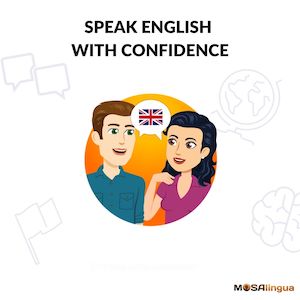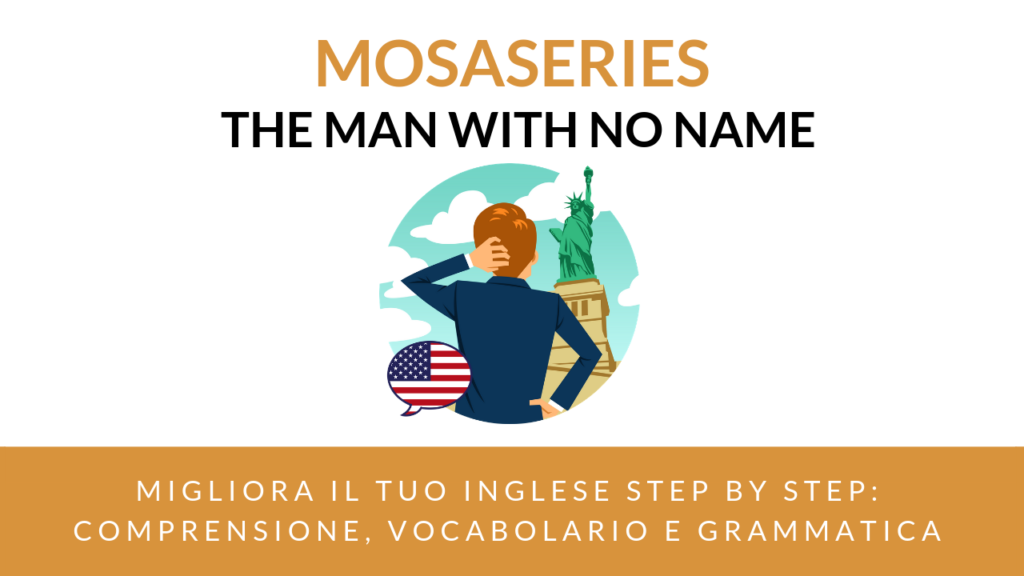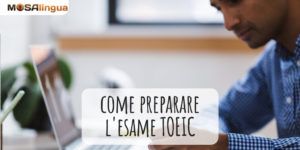Se devi prepararti per un viaggio, una riunione, un appuntamento, spesso conoscere le singole parole non basta. Quello che serve in queste occasioni è avere degli esempi di dialoghi in inglese da cui prendere spunto. Ovviamente parlo di conversazioni in inglese reali, quelle che avverrebbero tra nativi, e che puoi usare nelle varie situazioni. E oggi ti forniamo ben 5 esempi reali di dialoghi in inglese da imparare.

5 esempi di dialoghi in inglese da memorizzare
Per darti degli strumenti utili per imparare inglese, abbiamo deciso di condividere 5 esempi di dialoghi in inglese: una conversazione tipo per prenotare una stanza in hotel, una al ristorante, un dialogo in inglese per chiedere indicazioni stradali, uno da usare durante uno scambio linguistico e – che serve sempre! – una conversazione sul tempo 🙂 Alla fine trovi anche un altro esempio BONUS!
Esempio di conversazione in inglese: prenotare una camera in hotel
David is preparing for a trip to England. He phones the San Esteban hotel to reserve a room.
San Esteban Hotel, how can we help you?
Hello! I would like to know the price of a single room, please.
Thirty [30] pounds per night
Is breakfast included?
Yes, breakfast is included.
Ok, then I want a single room for four [4] nights.
When would you like your reservation?
From Tuesday May tenth [10th] to Saturday May fourteenth [14th].
That will be 120 pounds, under what name should I make this reservation?
On behalf of David Miller.
Ok. Your reservation has been made. You can pay upon arrival. See you soon!
Thank you very much! Bye!
Bye!
Esempio 2 : mangiare al ristorante
David wants to have lunch at an English restaurant.
I would like a table for one, please
Would you like to eat on the terrace or inside?
I prefer a table inside, near the window
This way… Here’s the menu. Would you like a drink?
No thanks
What would you like to eat?
As an appetizer (US) / a starter (UK), I would like the warm goat cheese salad
For the main course, I’ll have the seafood platter
And for dessert, I’ll have the crème brûlée.
Okay. And to drink?
A bottle of still water, please
Right away.
An hour later…
Can I have the bill please?
Here it is. That will be £15.50 please
Here you go. Thank you!
Esempio 3 : chiedere indicazioni per strada
David is at Farringdon and wants to go to Piccadilly Circus to meet up with Nadia.
Excuse me, could you please tell me how to get to Piccadilly Circus ?
Of course!
Take the yellow “Circle Line” in the direction of “King’s Cross St Pancras” and get off at “King’s Cross” station.
Once there, switch to the blue line called the “Piccadilly Line” towards Heathrow and get off at Piccadilly Circus.
It’s very easy!
Thank you!
You’re welcome!
OK, I think that I will look at the map…
Esempio 4 : durante uno scambio linguistico
David has a video call with a new language partner to practice the language a little bit before his trip.
Hi, David, nice to meet you!
Hi, Alex, nice to meet you, too!
I do not speak English very well, but I’m learning!
No problem. I’m here to help you.
How old are you?
I’m 30.
Where do you live?
I live in New York.
Awesome! It’s always been my dream to visit your city. I want to learn more about it.
It’s a very exciting place with a lot of things to see and do.
That sounds awesome. I definitely want to go there.
First I want to become fluent.
I’m sure you will, don’t worry.
What do you do?
I’m a history student.
What about you? What do you do for a living?
I teach math at school.
Oh, that’s very cool. Listen, I have to go.
Let’s talk again soon, OK?
Sure. Talk to you later.
Esempio 5 : parlare del meteo
David is videocalling Alex.
Hi, Alex.
Hi, David.
So did you surf today?
Unfortunately no. It rained all day long.
Oh. Is that usual in your area?
Yes, it doesn’t get too cold in the winter, but it rains a lot.
Sometimes we get severe storms.
We don’t wear heavy coats like in other countries but we always carry an umbrella.
And it’s like that throughout the country?
No, the south stays dry in the winter, but the temperatures are really low.
It’s weird because it’s always sunny there, but it’s freezing!
Wow! I hate cold winters, when it’s gray and windy.
That’s so depressing. But I do like the snow!
Me too. Do you ski?
Yes, I do. It’s really fun.
So, how’s the weather where you live?
Well, sometimes it gets very windy here, you know.
That kind of weather is not fun.
But in the summer, it stays warm and sunny.
It’s my favorite season.
Mine is the spring.
That’s when the weather is perfect here.
Not too hot, not too cold.
Perfect for surfing.
Un altro esempio di dialoghi in inglese:
My head hurts. I can not see, but I hear someone…
Doctor: Can you hear me?
?: Yes…
Doctor: Open your eyes, please!
I open my eyes, it hurts. I see a person.
Doctor: Hello!
?: Hello!
Doctor: My name is Martin and I’m your doctor. How are you?
?: Not very good, my head hurts.
Doctor: I see. And what’s your name?
?: My name is… is… I cannot remember… What is my name? …
?: Why can I not remember my name? What is wrong with me?
Doctor: Hmm, you don’t remember your name?
?: No, I remember nothing.
Doctor: Sir, I think you have amnesia. You hit your head…
?: Where am I?
Doctor: You’re in the New York City public hospital.
?: New York? In America?
Doctor: Yes, in the United States of America!
?: But why am I in America?
Doctor: I have no idea, but I can hear that English is not your first language. You really don’t have an accent but I can hear that you’re not American.
Doctor: I think you’re from a different country. Where are you from?
?: I cannot remember anything. And my head hurts… May I have a drink, please?
Doctor: Here is a glass of water and some Aspirin.
?: Thank you.
I drink the glass of water. I am scared.
?: Doctor, I am alone, and I am not in my country. I do not remember anything, not even my name.
Doctor: Yes, this is a big problem. But I have an idea. There are some papers and keys in your pockets. You are also wearing expensive clothes. Maybe you have an important job. Look at this piece of paper, maybe it can help you remember something.
I look at it. There is an address in New York. The doctor gives me the keys.
?: Mmmm, this does not help, I still do not remember anything…
Doctor: I’m very sorry, but someone needs to pay your hospital bill.
I am scared, and I also start to get angry.
?: Really? You are thinking about money right now? My head hurts a lot, I am alone, I am not in my country, and I cannot remember anything! You do not understand. I am scared.
Doctor: Yes, I can imagine. I’m really sorry. We want to help you.
?: OK, then please help me. I want to go to the address on this piece of paper. I need to find a friend or a family member.
Doctor: I’m sorry, you can’t leave until tomorrow. But other than this amnesia problem, you’re very healthy. So tomorrow morning, I can ask someone to go with you to this address. It’s not far.
?: Thank you very much doctor. I really want to remember everything and find my family tomorrow.
Doctor: Yes, we hope so, too. OK, now you need to sleep. Tomorrow is a big day for you.
?: Yes, I am very sleepy.
Doctor: So, goodnight.
?: Thank you, doctor. Goodnight.
Perché devi imparare questi dialoghi in inglese?
Mi dispiace dirti, però, che questi semplici dialoghi in inglese non ti aiuteranno a migliorare la tua espressione orale né a capire meglio l’inglese parlato… Questo perché, come abbiamo visto tante volte nel blog, l’inglese ha decine di suoni che in italiano non esistono. Gli italiani fanno degli errori di pronuncia inglese molto specifici.
Se ti stai chiedendo come leggere correttamente un testo in inglese se non sai quali sono questi suoni; se ti chiedi come indovinare la pronuncia inglese: beh, la risposta è: impossibile. L’inglese scritto e l’inglese parlato hanno molto poco in comune ed è quasi impossibile indovinare la pronuncia di una parola dal modo in cui è scritta. Ma non è un ostacolo insormontabile! La soluzione è anche semplice: devi ascoltare inglese il più possibile, cominciando da questi dialoghi in inglese, se te ne vorrai poi servire.
Come ascoltare questi esempi di dialoghi in inglese?
Forse a questo punto ti stai dicendo: “ok, bello, ma che ci faccio adesso con questi dialoghi in inglese?“. Puoi scegliere tra varie opzioni:
- Puoi iniziare leggendoli e per ogni parola che non conosci, ti consiglio proprio di cercare la pronuncia corretta su Google Translate, Forvo o sulle nostre app MosaLingua per averne una trascrizione “orale”.
– Google Translate, lo conosciamo tutti. È uno strumento di Google che ti permette di avere la pronuncia audio di una parola, da cliccare per ascoltarla. Unico inconveniente: la trascrizione orale è una vice sintetica ed alcune frasi possono contenere errori…
– Forvo è un sito comunitario e partecipativo su cui dei madrelingua registrano i suoni e le parole con la corretta pronuncia nativa. Intuitivo e semplice da usare, ti aiuterà in caso di problemi.
– Le nostre app per apprendere l’inglese. In MosaLingua Inglese trovi +3500 carte di vocabolario con la relativa pronuncia registrata da nativi anglofoni. Cerca la parola e ne avrai anche la trascrizione orale! - Puoi anche cercare degli esempi di dialoghi in inglese su MosaLingua Web! Infatti, i dialoghi in inglese che hai letto prima vengono proprio dalla nostra app per l’inglese e da MosaLingua Web. Non solo, nella nostra app – oltre alle parole con la corretta pronuncia di madrelingua – trovi anche delle conversazioni in inglese complete. Parlare del tempo libero, delle differenze climatiche, come telefonare a qualcuno… ci sono tantissimi esempi di dialoghi in inglese che potrai ascoltare per assorbire la corretta pronuncia sia sulla nostra app che su MosaLingua Web. E la versione audio, registrata da nativi, è disponibile con o senza sottotitoli in italiano o inglese.
Scopro MosaLingua Web!
E se vuoi saperne di più sulla nostra app per imparare l’inglese, leggi qui.
Bonus: dialoghi in inglese lento (slow English)
Sul nostro ricchissimo canale YouTube troverai un video di dialoghi in inglese. Si tratta di un video speciale per principianti di inglese, registrato una prima volta a velocità normale e poi più lentamente per farti prendere confidenza con i suoni e la pronuncia inglese corretta. È il tipo di dialoghi in inglese che trovi sulla nostra app o su MosaLingua Web.
Non dimenticare: iscriviti subito al nostro canale per altri video consigli
Trucco : migliora la tua comprensione orale con MosaSeries
Terzo trucco bonus: uno dei dialoghi in inglese di prima è tratto dal nostro nuovissimo strumento per imparare le lingue: MosaSeries : The Man With No Name. E sono sicura che hai capito di quale conversazione parlo… Hai presente, quella piena di suspense alla fine?!
Ed è proprio così: MosaSeries è una serie appassionante che racconta la storia di un uomo che si risveglia senza sapeer più chi sia. Una storia che abbiamo creato in inglese (e in altre lingue), con una versione audio e una scritta, per aiutarti realmente a migliorare la comprensione orale dell’inglese. MosaSeries è pensata per principianti e falsi principianti, ma anche per tutti coloro che hanno difficoltà a seguire dei dialoghi in inglese tra nativi o le serie tv e i film in inglese. Episodio dopo episodio, MosaSeries ti aiuta a migliorare la comprensione orale dell’inglese grazie a nuovo vocabolario, esempi reali di dialoghi in inglese ma anche esercizi, consigli sul modo migliore per ascoltare, tutorial.
Per saperne di più, ti invito a leggere questo articolo su MosaSeries: The Man With No Name o a visitare la nostra pagina per migliorare la tua comprensione orale dell’inglese.
E non dimenticare che, qualunque dialogo in inglese troverai su internet, non ti sarà molto utile se non ne sentirai anche la versione orale! Ma se vuoi più esempi di dialoghi in inglese, non esitare a scrivercelo nei commenti e vedremo di fare una nuova versione di questo articolo 🙂
Articoli che potrebbero interessarti:

Migliora la tua pronuncia in inglese

Buone notizie: possiamo aiutarti con la nostra Masterclass Speak English With Confidence
Questa formazione, divisa in 10 moduli, ti aiuta a migliorare passo passo la tua pronuncia in inglese per esprimerti in modo più fluido, sicuro e piacevole per te.
Scopri subito la nostra formazione!






Commenti